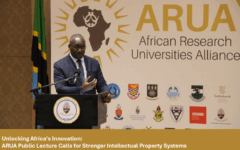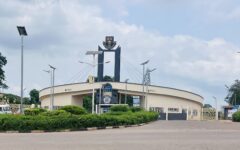NAFDAC DG Champions Collaborative Pharmaceutical Innovation at OAU’s Marquis Lecture
May 12, 2025 2025-05-12 16:09NAFDAC DG Champions Collaborative Pharmaceutical Innovation at OAU’s Marquis Lecture
The Director-General of the National Agency for Food and Drug Administration and Control (NAFDAC), Professor Mojisola Christianah Adeyeye, delivered an impressive call to action at Obafemi Awolowo University (OAU), urging industry, regulatory bodies, and academia to unite in advancing pharmaceutical research and development (R&D) in Nigeria.
Her address, titled “Industry, Regulatory, and Academia: The Future of Pharmaceutical Research and Development in Nigeria is Now,” was the centerpiece of the 38th Marquis Memorial Lecture, held at the Conference Hall of the OAK-Park on the University campus.
The event, attended by academics, industry leaders, and dignitaries both onsite and via Zoom, honored the legacy of Professor Victor Olufemi Marquis, a trailblazing pharmacologist who joined the University in 1967 and left an indelible mark on pharmaceutical research.
Earlier in the day, Professor Adeyeye paid a courtesy visit to the Vice-Chancellor, Professor Adebayo Simeon Bamire, represented by the Deputy Vice-Chancellor Academic, Professor Bola Babalola. Talks during the courtesy call not only explored avenues for strengthening ties between NAFDAC, OAU, academia in general, and the pharmaceutical sector, but also highlighted the NAFDAC-DG’s ties to the University dating back to the 1990s.
Professor Adeyeye proudly disclosed her Ifewara descent, particularly her Fajemirokun ancestry; her time in the OAU Faculty of Pharmacy on sabbatical leave; her affinity with Professor Lara Orafidiya, a former Dean of the Faculty; and her closeness to Professor Francis Oladimeji, the incumbent Dean of the Faculty and host of the lecture.
In her lecture, Professor Adeyeye painted a vivid picture of Nigeria’s healthcare landscape, spotlighting challenges such as limited access to quality care, a high burden of infectious diseases like malaria and tuberculosis, and rising non-communicable diseases including diabetes and hypertension.
She described the pharmaceutical industry as a growing force, buoyed by an expanding population and middle class, yet hampered by regulatory hurdles, funding shortages, and infrastructure gaps. “The time to act is now,” she declared, emphasizing that Nigeria’s future hinges on a robust R&D ecosystem.
Central to her vision is a proposed pilot program linking NAFDAC with select pharmaceutical manufacturers and Universities. Under this initiative, companies would fund targeted research projects at academic institutions, fostering innovation in areas like bioequivalence studies, drug formulation, and stability testing—key steps toward self-sufficiency in drug production.
Professor Adeyeye highlighted NAFDAC’s recent achievement of Maturity Level 3 (ML3) status from the World Health Organization, proof of its strengthened regulatory framework. “We have the potential, the partnerships, and the regulatory foundation evolving,” she said. “By focusing our efforts, we can unlock Nigeria’s R&D capabilities.”
The lecture struck a chord with attendees. Professor Francis Oladimeji, Dean of the Faculty of Pharmacy, welcomed the initiative in his address, noting its alignment with OAU’s commitment to pharmaceutical advancement.
Reflecting on the Marquis legacy, he recalled the late Professor’s pioneering research and the Faculty’s resolve to immortalize him through this lecture series, launched in 1982 after his untimely passing. “The Faculty is poised to stimulate breakthroughs in pharmaceutical research,” Professor Oladimeji said, expressing gratitude to Professor Adeyeye for her leadership and to the Marquis family, including 91-year-old matriarch Joanna I. Marquis, for their presence despite the short notice.
The DVC Academic, Professor Bola Babalola, who stood in for the VC, in her closing remarks, reaffirmed OAU’s dedication to fostering such collaborations, aligning with the University’s famous reputation as a hub of academic excellence.
The hybrid lecture concluded with a vote of thanks from Vice-Dean, Dr. A. O. Adepiti, leaving attendees inspired by the prospect of a revitalized pharmaceutical sector.
As Nigeria grapples with healthcare demands, Professor Adeyeye’s lecture serves as a rallying cry for stakeholders to bridge gaps, harness local talent, and build a future where pharmaceutical innovation not only thrives but transforms lives nationwide.






